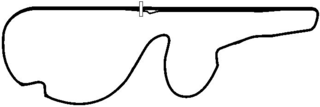Season results
| Round | Circuit | Winning Team | Winning Drivers | Winning Car |
|---|---|---|---|---|
| 1 | Fuji Speedway | #11 Harada Racing Company | | Alpine A441 |
| 2 | Fuji Speedway Report | #5 Katayama Racing | | March 75S-Mazda |
| 3 | Fuji Speedway | #5 Katayama Racing | | March 75S-Mazda |
The 1978 Fuji Long Distance Series was the second season of this series, with all races being held at the Fuji International Speedway. [1]
It was contested by Group 6 sportscars (class R2), Group 5 silhouettes (class R1) and touring cars (classes 1, 2 and 3).
| Round | Race | Circuit | Date |
|---|---|---|---|
| 1 | Fuji 500 km | Fuji Speedway | 9 April |
| 2 | Fuji 1000 km | Fuji Speedway | 23 July |
| 3 | Fuji 500 miles | Fuji Speedway | 29 October |
| Round | Circuit | Winning Team | Winning Drivers | Winning Car |
|---|---|---|---|---|
| 1 | Fuji Speedway | #11 Harada Racing Company | | Alpine A441 |
| 2 | Fuji Speedway Report | #5 Katayama Racing | | March 75S-Mazda |
| 3 | Fuji Speedway | #5 Katayama Racing | | March 75S-Mazda |
| Rank | Team | Car(s) | Points | Wins |
|---|---|---|---|---|
| 1 | | March 75S-Mazda Chevron B23-Mazda | 55 | 2 |
| 2 | | Alpine A441 | 50 | 1 |
| 3 | | Chevron B23-BMW | 18 | 0 |
| 4 | | Chevron B36-BMW | 12 | 0 |
| | Chevron B36-Mazda | 12 | 0 | |
| | March 73S-Toyota | 12 | 0 |

Super GT is a sports car racing series that began in 1993. Launched as the Zen Nihon GT Senshuken (全日本GT選手権), generally referred to as the All Japan Grand Touring Car Championship (JGTC), the series was renamed to Super GT in 2005. It is the top level of sports car racing in Japan.

Group C was a category of sports car racing introduced by the FIA in 1982 and continuing until 1993, with Group A for touring cars and Group B for GTs.

The Japan Le Mans Challenge was an endurance sportscar series based in Japan built around the 24 Hours of Le Mans that began in 2006. It was run by the Sports Car Endurance Race Operation (SERO) sanctioning body and ran under the rules laid out by the Automobile Club de l'Ouest (ACO). It is the first endurance sportscar series in Japan since the demise of the All Japan Sports Prototype Championship in 1992, although the ACO had run a single endurance race since then, the 1999 Le Mans Fuji 1000 km. The series was cancelled in 2007 following two poor seasons.

The Fuji (富士) was a sleeper train that formerly operated between Tokyo and Ōita in Japan. Operated by the Kyushu Railway Company and classified as a limited express service, it was discontinued from the start of the revised timetable on 14 March 2009.

The 1999 Le Mans Fuji 1000 km was an endurance race backed by the Automobile Club de l'Ouest (ACO), who ran the 24 Hours of Le Mans, and the Japan Automobile Federation (JAF), who ran the JGTC race series. It was run on November 7, 1999.

The Kaiji (かいじ) is a limited express train service in Japan operated by East Japan Railway Company. It runs mainly between Shinjuku Station in Tokyo and Kōfu Station in Kōfu, Yamanashi via the Chūō Main Line.
The Fuji Grand Champion Series (富士グランドチャンピオンレース) ran from 1971 to 1989. It was a drivers' championship in Japan and was originally for 2 litre Group B6 cars. The series was started in 1971, and all races were held at the Fuji Speedway circuit.

George Robert Fouché was a South African international motorsport race car driver, Le Mans 24 Hour winner and South African Formula 1 Powerboat pilot. He retired from competition in 2005.
The JAF Grand Prix (JAFグランプリ) is an auto race held in Japan by the Japan Automobile Federation.

The 6 Hours of Fuji is a sports car race held at Fuji Speedway in Oyama, Shizuoka, Japan. The race was held for the first time in 1967, and in 1977 became part of the new Fuji Long Distance Series. In 1982 a second 1000 km race known as WEC in Japan was run as a round of the World Sportscar Championship. The All Japan Sports Prototype Championship was formed in 1983, and since then co-sanctioned this event. The World Championship left after 1988, but the JSPC carried on both races until 1992. The race was revived in 1999 as an attempt to gauge interest in an Asian Le Mans Series; the series never materialized. The race was revived again as a part of the short-lived Japan Le Mans Challenge in 2007. The race returned again as part of the 2012 FIA World Endurance Championship season, but changed to a 6-hour race, with no distance limit.
The 1992 All Japan Sports Prototype Car Endurance Championship was the tenth and final season of the All Japan Sports Prototype Championship, which would be replaced by the All Japan Grand Touring Car Championship, as sportscar racing in the early 1990s changed drastically with the decline of prototypes. The C1 class champion was the #1 Nissan Motorsports Nissan R92CP driven by Kazuyoshi Hoshino and the C class champion was the #7 and #36 TOM'S Toyota TS010 driven by Geoff Lees.
The Fuji Long Distance Series was a Japanese endurance championship which took place mainly at Fuji International Speedway.

The JAF Grand Prix All Japan Fuji 1000 km, was the second round of both the 1989 All Japan Sports Prototype Championship and the 1989 Fuji Long Distance Series was held at the Fuji International Speedway, on the 30 April, in front of a crowd of approximately 58,000.
The 1977 Fuji Long Distance Series was the first season of this series, with all races being held at the Fuji International Speedway.
The 1979 Fuji Long Distance Series was the third season of this series, with all races being held at the Fuji International Speedway.
The 1980 Fuji Long Distance Series was the fourth season of this series, with all races being held at the Fuji International Speedway.
Team Taisan is a Japanese auto racing team founded in 1983 by Yasutsune "Ricky" Chiba and owned by the Taisan Industrial Company. Most active in the Super GT Series, formerly known as the All Japan Grand Touring Car Championship (JGTC), Taisan has been involved in all but one season from 1994 to 2018, taking a sabbatical in 2015. During that time they have won eight team championships and four drivers championships, representing manufacturers Ferrari, Porsche, Dodge, Toyota, Nissan, and Audi. Team Taisan has also participated in the 24 Hours of Le Mans, winning their class on their debut in 2000. For nearly their entire career, Taisan has been sponsored by tire manufacturer Yokohama Rubber Company, often carrying the name of Yokohama's Advan brand.

The All Japan Fuji 1000 km, was the sixth round of the 1990 All Japan Sports Prototype Championship and the fourth round of the 1990 Fuji Long Distance Series which was held at the Fuji International Speedway, on October 7, in front of a crowd of approximately 41,000.

The Nissan Skyline Turbo C is a Group C prototype sports car developed by Garage Le Mans for the 1983 All Japan Endurance Championship and Fuji Long Distance Series. While used as a marketing tool for the R30 Skyline, the Skyline Turbo C has no parts commonality or shared origin with the street car. The engine is equipped with Nissan's LZ20B type.
The Mooncraft Shiden 77 was a Group 6 sports prototype racing car introduced by Mooncraft in 1977.